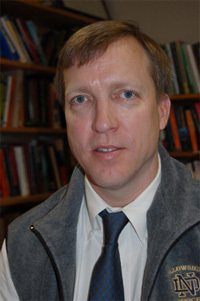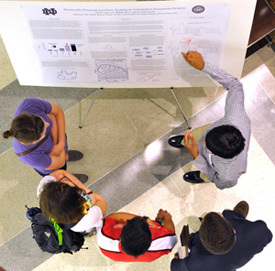“Notre Dame is strong in undergraduate teaching, but the next frontier is students working with professors to do research,” says Daniel Lindley, associate professor of political science and director of the University of Notre Dame’s new Center for Undergraduate Scholarly Engagement (CUSE).
“Research is development of the mind—the development of students who will be of service to the University and to the world,” he says.
The center, which opened on the second floor of Notre Dame’s Geddes Hall late last year, will offer ideas, advice and centralization of information for undergraduates interested in doing research, in addition to partnering with faculty to create research opportunities.
“We are a University-wide center whose mission is to increase intellectual vibrancy on campus, increase the breadth and depth of undergraduate research and help students apply for and win fellowships,” Lindley says. “We thank our generous benefactors who helped catalyze CUSE into existence.”

The University is part of a nationwide trend in encouraging students to engage in research at earlier stages in their education, says Lindley. Research can be about gaining an appreciation for and transmitting knowledge about literature, understanding the biosphere or making discoveries that will improve human life, whether through medicine or art, he adds.
“Our mission is to help all students, not just the best and brightest, be the best they can be—to push them to new levels, and to try new things,” Lindley says.
Physics Professor Philippe Collon, CUSE associate director for scholarly engagement, launched the Sorin Scholars program, which identifies and mentors some of the University’s best and brightest students each year.
“Students still don’t realize they can make a difference in their field, whether science or arts and letters,” he says.
Collon will work with the Office of Admissions and Notre Dame’s First Year of Studies Program to identify motivated students; he will also help match students with faculty based on research interests.

Cecilia Lucero, assistant director for undergraduate research, “has the best view in the University of where student research funding is available,” says Lindley. She also has developed a common application that allows students to apply to several centers and funding sources with one form. Lucero is able to directly fund or supplement funds for student research projects. She also helps disseminate the results of student research with an annual University-wide Undergraduate Scholars Conference.
If students are interested in research but don’t know where to start, CUSE is the place to begin, Lucero says.
“We try to show that there’s not a division between teaching and research,” she adds. “Research is part of a great education.”
Roberta Jordan, assistant director for fellowships, helps students apply for, and win, nationally competitive fellowships such as the Rhodes, Marshall, Mitchell, Fulbright, Gates, Churchill, and Truman – just a few of the over 100 fellowships for which Notre Dame students may apply. “Fellowships allow students to embark on their own research projects, or continue their education at the graduate level,” she notes. “From art history to economic development or bioengineering, Notre Dame students can and should be at the leading edge in their chosen field, and a fellowship can help get them there.”
More information about CUSE is available on the Web at cuse.nd.edu.
Contact: Daniel Lindley, cuse@nd.edu